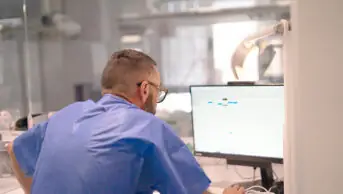
Shutterstock.com
Using ‘mystery shoppers’ to monitor online pharmacies is to be considered by the General Pharmaceutical Council (GPhC).
Following the publication of an investigation into online pharmacies by the BBC on 5 January 2024, which reported that it had been able to buy prescription-only medicines from 20 online pharmacies without checks, such as GP approval, the regulator has set out the actions it has taken to regulate online pharmacies.
It has also drawn up a list of seven further steps it will take to tighten regulation, guidance and monitoring in this area.
Details of the proposed next steps were published in papers discussed by the GPhC council on 22 February 2024, which said: “The BBC investigation with the ongoing risks to patients and the public provides a further stimulus to re-focus and specify more clearly the next stages of work in this area as one of our priorities for the remainder of this financial year and through 2024/2025.”
In the council papers, the regulator highlighted the fact that undercover BBC reporters had bought prescription-only drugs as part of the investigation into online pharmacies.
“The BBC investigation was based [on] a form of mystery shopping to identify whether it was possible to obtain high-risk medicines,” the papers said.
“We have considered previously how and if we could engage in similar activity as part of our overall inspection and enforcement approach.
“This does potentially engage the Regulation of Investigatory Powers Act 2000. We do believe, given the continued risks to patient safety, that we need to work through what is possible within the limits of the legislation.”
Other measures proposed in the council papers include setting out criteria for the frequency of inspections of online pharmacies, “particularly when new pharmacies are registered”.
The papers added: “We need to consider whether, and if so how, the guidance [for distance-selling pharmacies] should be updated given the insight we now have from enforcement action and the ongoing concerns identified by the BBC investigation.”
The regulator also said it had asked the BBC for details of the online pharmacies from which it was able to buy prescription-only medicines, and that it would look at running a conference or roundtable event to discuss issues relating to online pharmacies and online prescribing.
Commenting on the GPhC proposals, Darren Powell, chair of the Royal Pharmaceutical Society’s Digital Pharmacy Expert Advisory Group but commenting in a personal capacity, said: “I think this is a good basis from the GPhC in the much-needed regulation of online activities of pharmacies.
“We can always ask for increased activity at a faster pace, but these are new areas of professional development, and we need time to improve the regulation and further develop and inform the standards, against which enforcement can take place — ultimately keeping the safety of patients at the centre of it all.”
A spokesperson for the GPhC said: “We have considered previously how and if we could engage in ‘mystery shopper’ style activity as part of our inspection process, to assess how well pharmacies adhered to standards. Given the continued risks to patient safety, we will be considering the possibilities of what we could do in the future, within the legal framework.”
The Pharmaceutical Journal reported in 2022 that online pharmacies were eight times more likely than bricks-and-mortar pharmacies to fail on GPhC regulatory standards.
Analysis of GPhC inspection reports found that 28 (21.7%) of the 129 ‘distance-selling’ pharmacies that had been inspected between April 2019 and March 2022 failed to meet at least one of the five regulatory standards following their most recent inspection.
This was in comparison to 75 (2.6%) of the 2,808 high street pharmacies that were inspected over the same period.


